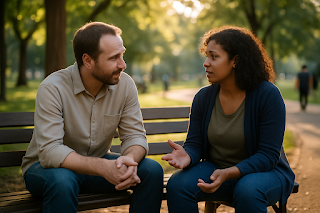Dear Reader,
Have you ever been in a conversation with someone who feels completely unappreciated?
They often say things like, “No one ever talks to me,” or “I just can’t relate to those people.” When asked for more understanding, the answer may come back as, “We have nothing in common,” or “They seem strange.”
Recently, I’ve had several conversations along these lines. When I asked, “Did you go up to them and try to get to know them? Did you ask how they were doing?”—the most common response I heard was some version of, “No. I was waiting for them to talk to me.”
It’s here that I gently offer a hard truth I’ve had to learn myself: the real barrier is often not them, but us. If you want to have friends, you need to be a friend. You can’t stay on the sidelines of life, expecting others to make the first move. You have to get in the game.
That’s not to say it’s always easy. Some people won’t let you in. But don’t let that discourage you. Keep showing up. Keep trying. Trust the process. Fellowship and friendship are acts of faith.
There is deep wisdom from both spiritual and scholarly voices that support this call to reach out:
William James, the father of American psychology, said:
“The deepest principle in human nature is the craving to be appreciated.”
Carl Rogers, a pioneer in humanistic psychology, observed:
“When someone really hears you without passing judgment… it feels damn good.”
The philosopher Albert Camus reminds us:
“Don't walk behind me; I may not lead. Don't walk in front of me; I may not follow. Just walk beside me and be my friend.”
From scripture, we read in Proverbs 18:24 (KJV):
“A man that hath friends must shew himself friendly: and there is a friend that sticketh closer than a brother.”
In our Latter-day Saint tradition, Elder Jeffrey R. Holland taught:
“Christlike love is the greatest need we have on this planet. In relationships, it is kindness—not judgment—that invites unity.”
(October 2018, “The Ministry of Reconciliation”)
And President Gordon B. Hinckley wisely observed:
“The most miserable people I know are those who are obsessed with themselves. The happiest people I know are those who lose themselves in the service of others.”
(October 1986, “Whosoever Will Save His Life”)
Those in recovery circles know this truth well. Dr. Bob Smith, co-founder of Alcoholics Anonymous, put it plainly:
“If you’re going to stay sober, you’ve got to help someone else.”
And in the AA Big Book, we’re told:
“Nothing will so much insure immunity from drinking as intensive work with other alcoholics. It works when other activities fail.”
(Alcoholics Anonymous, p. 89)
In recovery, in faith, and in life, connection is not passive. It is something we choose, cultivate, and pursue. While we all long to be seen, we must first learn to see. While we hope to be loved, we must first become love.
Healing begins not when others reach out to us—but when we step out in courage, humility, and compassion toward them.
So today, if you’re feeling unseen, unheard, or alone—try this: look around. Ask someone how they’re doing. Be the one to step forward. That single moment of kindness might open the door to a friendship that changes everything.
Warmly,
Steve Burgess


No comments:
Post a Comment